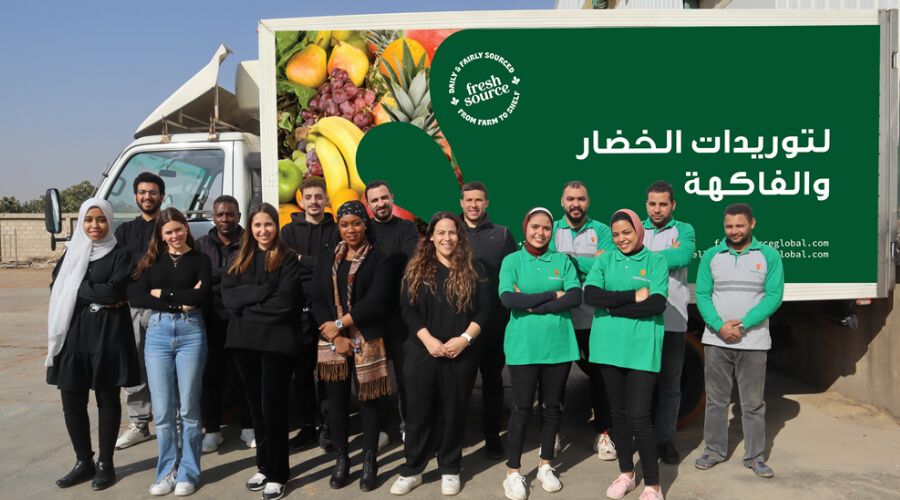FreshSource raises Seed round to cut food loss in Egypt

For Egypt, agriculture is one of its most critical sectors, accounting for more than 11 per cent of its gross domestic product (GDP) and 28 per cent of all jobs in the country. Yet despite its importance, the sector suffers from a long and complex retail supply chain that results in low food availability, high rates of food wastage as well as inflated consumer prices.
A 2020 study released by the Egyptian Center for Economic Studies (ECES) showed that the final retail price of fresh produce sold to consumers is twice as high as the original price of the produce initially sold to the farmer. This is mainly chalked up to inefficient logistics, forcing retailers to raise prices to make up for the money spent on transportation and inventory management processes.
The agricultural sector is one of the latest industries to integrate technology into its operations and has recently become a target for several tech startups looking to disrupt its largely traditional supply chain. FreshSource in Egypt, is one startup that looks to tackle the issue of food loss by enabling farmers to connect directly with businesses without the involvement of third parties or commercial intermediates. The startup was co-founded by sibling duo Farah Emara and Omar Emara in 2018 and has been operational since early 2019 and has just raised a seven-figure Seed round led by Wamda and 4DX.
"I think agritech in general is still gaining traction worldwide, and we’ve seen a lot of advancements throughout the industry over the past few years. I think Egypt will continue to establish itself as one of the worldwide agri pioneers. I believe the reason it has been overlooked is that it is an extremely difficult and complicated field. Working with perishable goods with dynamic prices makes it hard to disrupt. Our cold chain expertise that is built three decades of experience in the field from the family business gave us a strong foothold in the industry and strategic advantage," says Omar Emara, co-founder at FreshSource.
According to the Food and Agriculture Organisation (FAO), around 45 per cent of agricultural production ends up in landfills due to the poorly run cold chain infrastructure.
“This was shocking to us knowing that nearly half of the fresh produce makes it to the shelves. The consumer is paying an incredibly increased price to make up for that loss," she says. "We started to research and found out that it occurs due to some harvesting processes, storage and transportation methods as well as poor packaging. There are some materials that are not really supposed to be used.
To help address the food loss issue at its core, the startup aims to serve farmers' needs throughout the agricultural production stages, having closely witnessed challenges faced by farmers during and post-harvest phases.
FreshSource offers medium to large scale farmers the opportunity to enter into contract farming, thereby enabling them to have proper access to finance as well as farm input products. At the time of the harvest, FreshSource procures fresh produce directly from farmers and delivers it to businesses such as restaurants and hotels, and digital grocery ordering marketplaces. The startup also provides end-to-end last-mile connectivity for further enhanced logistics and storage services.
By connecting farmers directly to vendors and businesses, the startup claims to help farmers drive down the food loss rate by 20 per cent. This is in addition to ensuring both farmers and businesses get the best deals and thereby maximise their revenues.
Its latest round of funding will be used to scale its operations across Egypt and serve more farming communities.
"We are planning to use the funds to expand our team and invest more in our technology. Also, we are going to be covering all of Egypt's governorates by the end of 2023. By 2024, we will start considering a global expansion plan," Farah adds.
For FreshSource, building a product that can be scalable as well as easily accessed by farmers and businesses has been the biggest challenge. Farah explains that they have been faced with reluctance by its users who refuse to fully move away from pen and paper.
"In the beginning, we were just using WhatsApp and telephones to interact with users. We had people leave us a missed call, we can call them back so that they don't have to pay anything. And then we started to introduce different payment methods for them to take their wages and also other means for them to communicate with us. And that's how we're going to continue to roll out our tech, in incremental phases," she says.
For Omar, being one of the first agritech startups to address food loss carries "a lot of responsibility to prove that the agriculture industry is ready for disruption. It has incredible potential as one of the largest industries in Egypt and in the region. We will continue innovating and working towards our mission".


